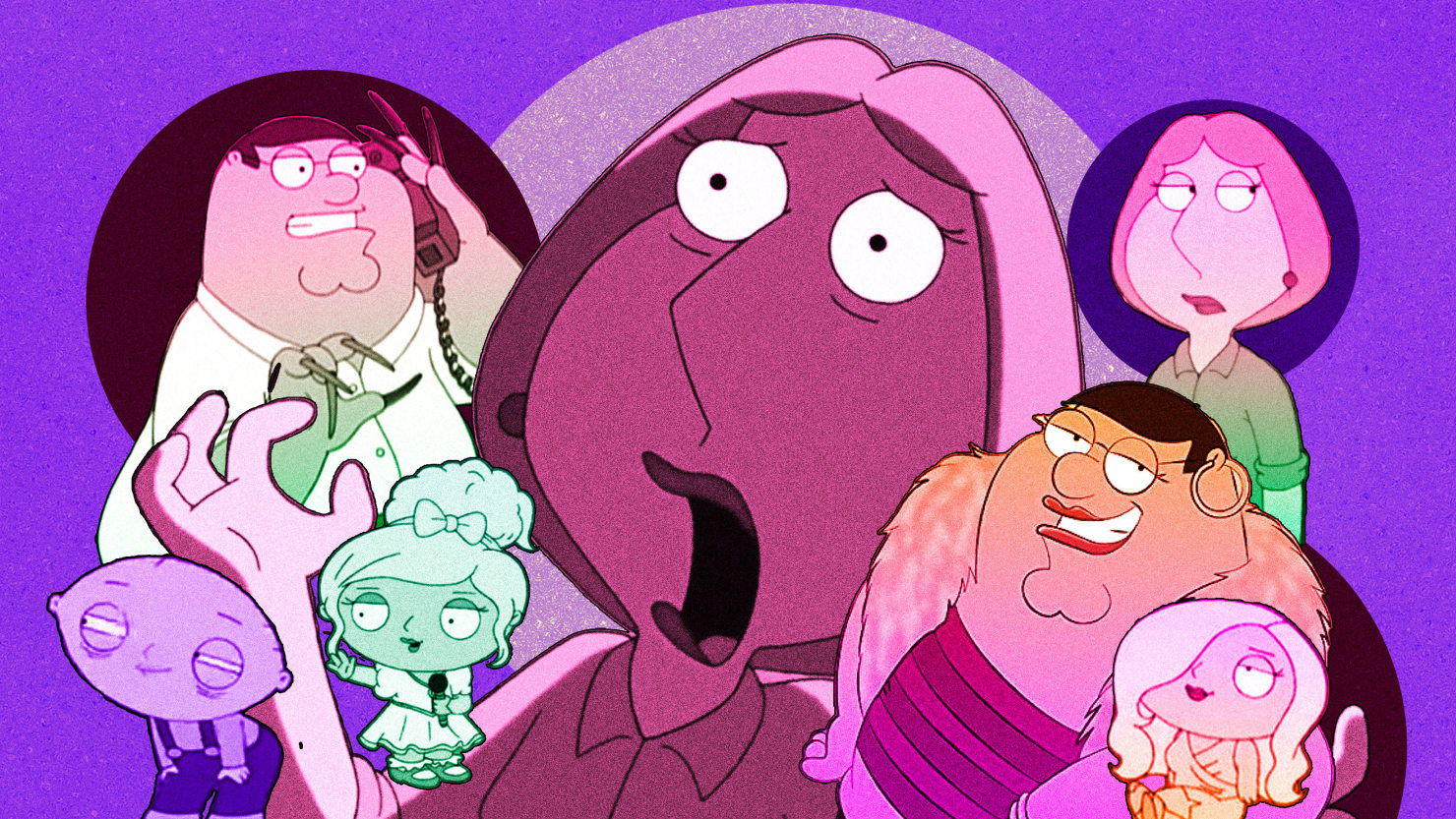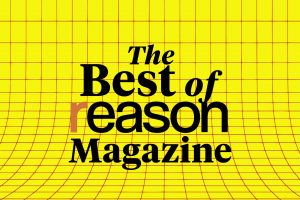Of all the TV shows to have come out in the past 25 years, Family Guy is the last one you would think gay people would associate themselves with. Since its debut in 1999, the long-running irreverent animated Fox series has carried a checkered history with its depictions of queerness. Consider, for instance, Quagmire’s dad coming out as a trans woman and Brian vomiting a grotesque amount after sleeping with her, or Peter Griffin participating in a “gay gene” experiment and his subsequent transformation into a flamboyant gay stereotype.
But over the past two years or so, Family Guy has experienced somewhat of a cultural resurgence online—especially in gay internet communities. Various scenes from the show have been circulating on Twitter and TikTok, consistently used as reaction pics and GIFs to comment on current cultural trends. Just a few months ago, a clip of Lois Griffin screaming her husband’s name from the Season 21 episode “The Munchurian Candidate” went viral throughout queer social media spaces.
The clip and its subsequent reaction illustrated how Family Guy still manages to maintain such a commanding pull over the internet—and how much of the internet is so heavily dominated by queer spaces.
In the episode, a sex therapist hypnotizes Peter to sexually satisfy Lois (or anyone he’s near) when he hears the jingle from the entertainment news program Extra. During a dinner with Lois’ parents, Peter hears the trigger sound while delivering a plate of food to his ailing mother-in-law, and… well… you can fill in the blanks. Cut to Lois realizing what’s happened and running hurriedly up the stairs; upon discovering this semi-incestuous horror, she releases one long, drawn-out, blood-curdling, “PeeeeeTAAAAAAHHHHHHHH!”
Shortly after the episode’s premiere, Lois’s piercing shriek was memed ad nauseam (and praised for Alex Bornstein’s exceptional voice work). But it also became a soundtrack for lip dubs on TikTok and was remixed to transition into pop songs like Björk’s “Army of Me” and Rihanna’s “Disturbia.”
Though they seem elusive on the surface, the reasons behind that clip’s sudden popularity, particularly among chronically online gays, are actually quite simple. The purely over-the-top theatrics of the sequence are something that many gay people love watching: absurd, messy heterosexual family melodrama. That’s essentially what Family Guy is: a transgressive, satirical portrait of a dysfunctional American family and its many ridiculously heightened shenanigans.
Virtually every Family Guy character has been meme-ified by the online gay world, their mannerisms and sartorial choices recontextualized as reaction images or shitposts and filtered through a distinctly queer lens. Stewie, the most obviously queer-coded Family Guy character since the show’s inception, has had his fair share of gay memes made about him, what with his multiple appearances in drag, usage of a pink boa as an emergency flare, and drunken vibing to a variety of bops.
And although Peter represents an archetypal straight American father figure, pictures and clips of a feminized Peter are frequently reprocessed through the gay Twitter meme machine. The internet seizes on any moment when he’s dressing in drag, wearing long acrylic nails, lamenting how much he wishes he was Beyoncé, or showing us his lookalike great-aunt Legs Go The Way Up Griffin.
And somehow, these moments abound in Family Guy. For a show that has so many jokes that poke fun at queerness and involve drag, it’s a bit ironic that those jokes simultaneously lean into its characters’ latent flamboyancy, to the degree that the gay internet picks up on and fawns over.
When a Family Guy character acts outside of their usual selves or subverts gendered expectations, it easily, readily transforms from a throwaway peculiarity into inspired gay meme material. For example, the uber-masculine cop Joe Swanson dressing in drag for his Fiona Apple tribute video can be retooled to convey insecurity or longing. Social pariah Meg going apeshit on her peers in the school cafeteria can be redefined to illustrate what it was like being a Taylor Swift fan in 2012. Peter’s rendition of Music Man’s “Shipoopi” can be scored to SOPHIE’s “Immaterial,” and he and his Drunken Clam gang doing synchronized choreography at a disco can be recut to Beyoncé’s “CUFF IT.” Truly anything is possible on Twitter. Where else could Peter meet iconic gay pop stars Charli XCX, Arca, and Ethel Cain?
But above everyone, Lois takes the cake as the paragon of Family Guy memes, queer or otherwise. As evidenced by the recent meme virality of M3GAN, gay people love a resilient, occasionally unhinged maternal figure, and Lois encapsulates exactly that. She’s a fed-up housewife, who gets off on shoplifting, wears provocative outfits, stares haggardly at a bottle of pills in her kitchen, and experiences a few instances of psychological unraveling. She is a vessel through which gay Twitter can communicate a whole host of emotions: adrenaline-rush excitement and euphoric joy, vague annoyance and deep-seated frustration, loneliness and horniness. One of her lines from the Season 19 episode “Customer of the Week”—“Fine! You win with your gay stuff!”—reads as caustic in context, but it conveyed a completely different meaning when it became a popular sound on TikTok last year.
Despite all these memes, however, it’s hard to ignore that Family Guy is often chock full of homophobic humor. And I say this even as a queer person, who dressed up as Freshly Waxed Lois for Halloween last year and avidly watched the series and other Seth MacFarlane ventures like American Dad and The Cleveland Show growing up.
This is a show that traffics in racist jokes, homophobic caricatures, and condescending digs at trans identity. Just go on YouTube, type in “family guy offensive humor,” and you’ll find an abundance of 10+ minute compilations of just that (some even carry the generous subtitle warning “Not for Snowflakes”). Isn’t it counterintuitive, even contradictory, for marginalized people to find humor in Family Guy’s boundary-pushing jokes, when so many of them target our identities? Even with all of Family Guy’s thematic material that panders to the gays, whether knowingly or unknowingly, how can we ignore the show’s more insensitive elements?
Despite its offensive humor, especially in its more dated Bush-era seasons, there is something so mesmerizing about Family Guy’s unapologetically brazen humor. Perhaps it’s because its steadfast resistance against “socially acceptable humor” is in fact itself very queer. Queerness as both an identity and ideology feels like an innate opposition against what is acceptable by society’s standards; it tracks that queer people are drawn to Family Guy, something that is so unabashedly giving the finger to social norms.
Family Guy’s politically incorrect vulgarity also touches on a very universal, often unspoken human experience: laughing at things we aren’t supposed to laugh at. That impulse applies to queer people especially. We love being entertained by extremely stupid, uncouth pop culture just as much as we love repurposing characters and scenes from that specific strain of pop culture for our own amusement.
You can apply a similar logic to, say, the meme virality of Vice President Kamala Harris, whose incoherent word-salad rambling, enthusiastic dancing, and nonstop giggling at nothing particularly funny—“Big Sister General,” anyone?—are catnip for Twitter gays, all despite her sketchy track record involving LGBTQ+ issues. We know Kamala hasn’t always had queer people’s best interests in mind, and yet we are somehow infatuated by her infectious goofiness despite it.
The same goes for The Real Housewives, a franchise filled with the vilest, most reprehensible people on planet Earth, yet practically functions as a gay meme factory. There is a queer sensibility to how ridiculous these women are, whether it’s because we find their cringeworthy behavior powerfully anti-norm (Kamala) or appreciate how willfully ignorant of social niceties they are (every Housewife). Naturally, queer people want to meme-ify these women who are so hilariously over-the-top in their aversion to the behavioral status quo.
This queer meme phenomenon can be seen as either an act of identification or reclamation, a primal attraction to a piece of media that feels “other” from the rest of mainstream entertainment or a desire to take a piece of media ostensibly made for straight audiences and edit it to evoke a queerer connotation. Whether intentional or not, Family Guy has a remarkable ability to create such outlandish moments, like Lois’s scream, that queer people can both identify with and reclaim for their own creative disposal. (Who among us hasn’t wanted to let out a slightly too long guttural cry of shock once in a while?)
Yes, the show’s executive producers Alec Sulkin and Rich Appel have tried to acclimate to the times, with their recent admirable intent to phase out “gay jokes.” But Family Guy has enough juvenile gags and unconventional characters to sustain the online gay community for many years to come.



